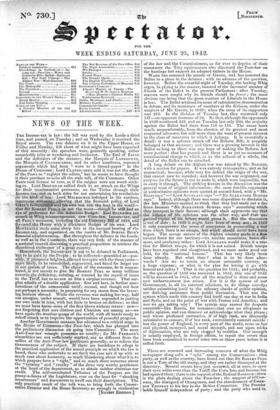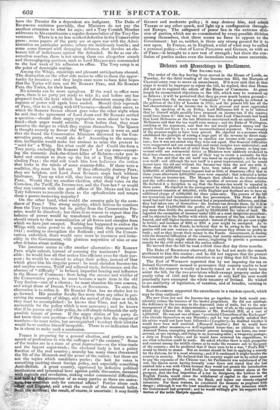,There are renewed and increasing rumours of what the Whig
newspaper slang calls a " split " among the Conservatives : that party, as well as the country, have found out that Sir ROBERT PEEL is not a Tory of the old stamp, and they are rather dismayed at the discovery. Several events have just occurred, all at once, to open their eyes wider even than the Tariff, the Corn -law, and Income-tax bad opened them: there is the support of the Radical ROEBUCK; there is the plain dealing about the Poor-law ; the support of O'Cor- NELL, the disregard of Orangemen, and the abandonment of EMER■ SON TENNENT to his fate in the Belfast Committee. The Premier holds himself independent of party ; and the party who used to
have the Premier for a dependent are indignant. The Duke of RICHMOND exclaims peevishly, that Ministers do not pay the smallest attention to what he says ; and a Tory Cornish Member addresses to his constituents a regular denunciation of the Tory Go- vernment. There is a no less marked defection in the Conservative press : some papers of the party are at open war with the Admi- nistration on particular points ; others are insidiously hostile ; and some come forward with damaging defences, that involve an ela- borate bill of indictment against the defended. So far as our ob- servation reaches, there is not among them one altogether stanch and thoroughgoing partisan, such as Lord MELBOURNE commanded to the last week of his adhesion to office. The Tory camp is at the point of downright mutiny. Among the Whigs, rejoicings and pleasant anticipations abound. The distraction on the other side seems to offer to them the oppor • tunity for invasion ; and they begin once more to have faint hopes that the Tories will turn out Sir ROBERT PEEL, and Sir ROBERT PEEL the Tories, for their benefit.
No mistake can be more egregious. If the road to office were open, there is no party yet ready to take it ; and before any has prepared itself; the heat which has bred dissension among the oc- cupants of power will again have cooled. Should their reproach of PEEL, that he is acting with O'CoNNELD—should their sneer, to which Sir ROBERT INGLIS almost gave voice the other night when he said that the agreement of Lord Joint and Sir ROBERT settled a question—should their angry reproaches seem about to be rea- lized—their anger would subside. Even before that, they must perceive the danger to which they expose themselves. The Queen is thought secretly to favour the Whigs : suppose it were so, and that she found the Conservative Ministers disowned by the Con- servative party, what would she do ? According to the assump- tion, inclination would make her anxious to seize the pretext to "send for" a Whig. But what could she do? Could she form a Tory party, excluding Sir ROBERT PEEL? Let any man—except- ing the romantic Jack-the-Giant-killer of Helston—take pen in hand and attempt to draw up the list of a Tory Ministry ex- cluding PEEL: the trial will teach him how ludicrous the notion that lurks in the minds of some country-folks. If there were a coalition, they must be left out. If they effectually destroy PEEL, they are helpless, and Lord JOHN RUSSELL steps back without hindrance. Turn up what will, they lose every thing if they lose PEEL. Would they try another election, after their votes on the Corn-law, the Tariff; the Income-tax, and the Poor-law ? or would they rest content with the good offices of Mr. MILES and his few Tpry followers to reconcile them to the agriculturists and return them a power-bestowing majority ?
On the other hand, what would the country gain by the over- throw of PEEL? The strong majority, which derives its numbers from the Tory interests but its policy from the Conservative Pre- mier, would be dissolved ; but there is no reason to expect that the balance of power would be transferred to another party. We should return to that neutralization of all forces and energies from which we have just escaped. Nothing has happened to endow the Whigs with 'more power to do something than they possessed in 1841 ; nothing to strengthen the Radicals ; and with the Conser- vatives enfeebled, there would once more be inertness and imbe- cility in the Government, with glorious majorities of nine or one after debates about nothing.
The juncture seems to offer another alternative : Sir ROBERT PEEL might submit, instead of coercing the mutineers ? Impos- sible : he would lose all that makes him efficient even for their pur- pose; he would be reduced to adopt their policy, instead of that which gives him his singular power: he must abandon Income-tax and surplus revenue, Tariff and relieved trade, forbearance and the absence of " difficulty " in Ireland, impartial bearing and influence in the House of Commons : from being the creator and wielder of the Conservative power, he must become a mere item in the old Tory faction—one of a chorus ; he must abandon his own courses, and adopt those of INGLIS, VYVYAN, or RICHMOND. To state the alternative is to refute it. Sir ROBERT PEEL has no choice but to go forward. His peculiar faculty lies more than any other in per- ceiving the necessity of things, and the arrival of the time at which they must be accomplished : he knows that Time, and not he, is answerable for the policy which is now necessary ; and he knows that if he pursue any other policy, be will simply relinquish the only possible tenure of power. If the angry rioters of his party do not know their own position—if they fail to give him the support of numbers—he must retire, but unvanquished : to adopt their mistake would be to confess himself incapable. There is no indication that be is about to make such a confession.



























